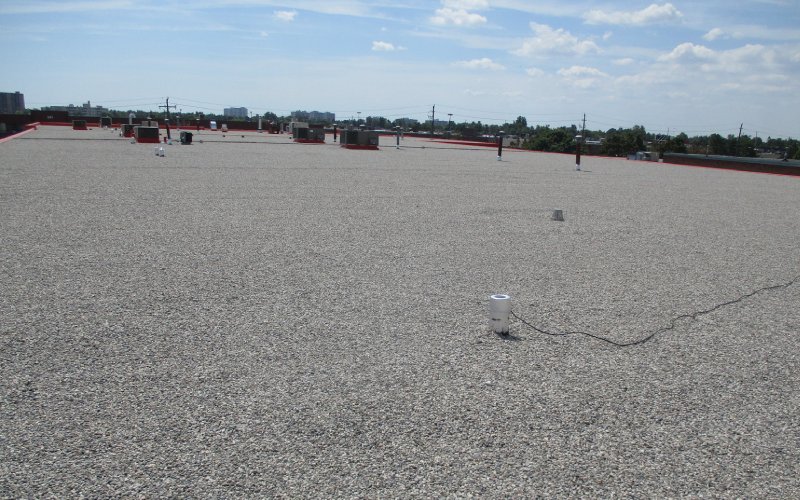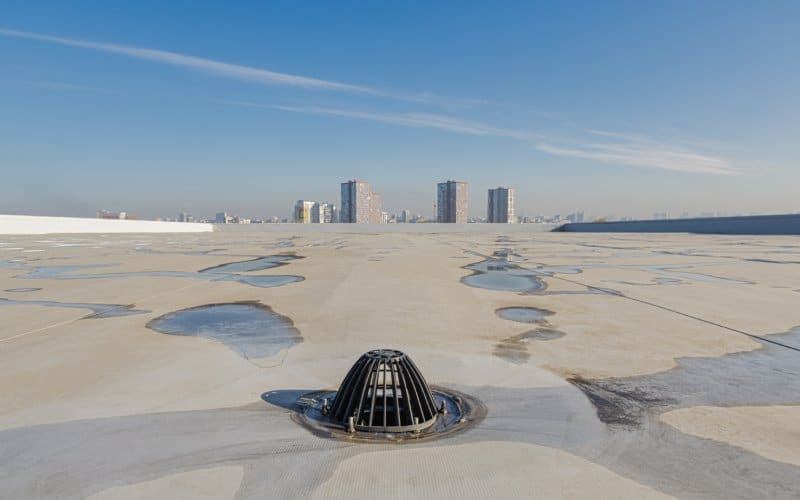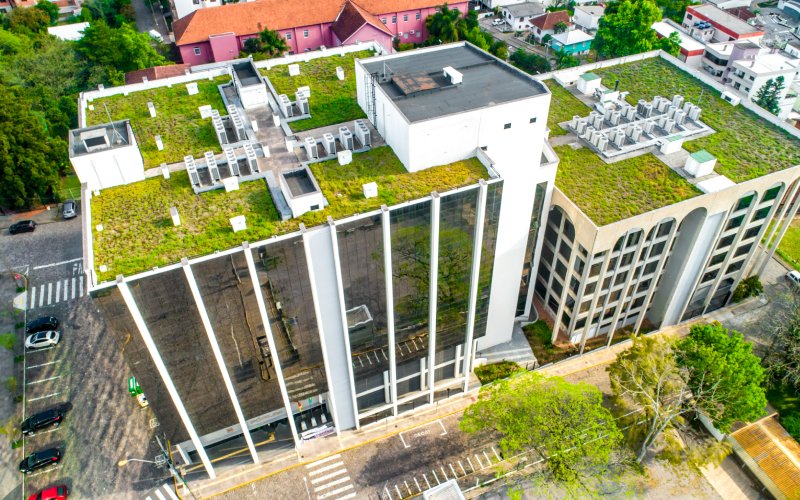500 Hood Road, Suite 320Markham ONL3R 9Z3

A commercial roofing condition assessment is a comprehensive evaluation of a commercial building's roofing system, focusing on its long-term performance, maintenance, and potential for improvement. Unlike a standard inspection, it goes beyond identifying immediate issues, delving into the overall condition and lifespan of the roof. It includes a detailed analysis of materials, structural integrity, drainage, and insulation, aiming to provide a strategic plan for roof management.
This assessment helps building owners and facility managers make informed decisions about repairs, maintenance, and potential upgrades, ultimately ensuring the roof's durability, energy efficiency, and cost-effectiveness over an extended period.
A comprehensive roof condition assessment aims to meet several important objectives. It aims to assess whether the roof system is effectively fulfilling its designated purpose of protecting the commercial building from the elements and maintaining structural integrity. Secondly, it pinpoints any indications of weakness, vulnerability, deterioration, or potential hazards within the roof system. This includes identifying issues such as leaks, damaged or degraded materials, excessive loading, and areas at risk of structural compromise.
A thorough condition assessment goes beyond identifying problems; it also classifies the required repairs and maintenance tasks and prioritizes needed work to provide a roadmap for roof management. A full assessment aims to ensure the long-term health and optimal performance of the roof, extending the lifespan and reducing the potential for costly repairs or premature replacement.

A commercial roof condition assessment completes a thorough evaluation of various crucial aspects of the roofing system. It goes beyond an inspection and encompasses a comprehensive analysis to help property managers and owners make informed, strategic decisions about the building's roofing systems.
An assessment starts with a full inventory of the existing roof systems. This documents the types of materials used, existing insulation, drainage components, and any added features such as rooftop equipment or green roofing elements.
Next, a detailed examination of the roofing materials and systems are completed to determine their current states. The condition of the membrane, flashings, seams, and other critical components are assessed and any signs of damage, wear, or aging are identified.
All deficiencies are identified and documented with details. This includes issues such as leaks, damaged or deteriorating materials, inadequate insulation, and problems with drainage systems. The structural integrity of the roof is examined and evaluated, including the underlying support structure and other components.
Not only are action items identified, but they are prioritized to make the property owner’s planning easier. By distinguishing between immediate repair needs, maintenance tasks, and long-term replacement plans, resources are allocated more efficiently.
A key goal is to estimate the remaining service life of the roof. The roofing systems types and conditions are considered in conjunction with expected weather conditions and other factors, plus the quality of previous maintenance and repairs, to create a life expectancy estimate. Based on this service life estimation, a forecast for the anticipated year of roof replacement can be made.
A detailed cost analysis is also provided, with estimates for maintenance and repair work that may extend the roof's life; this can be compared against budget projections for a full roof replacement.
Proper installation, safety, compliance with building codes, fire regulations, and other requirements are considered. An assessment may also consider sustainability aspects, evaluating whether the current roof or proposed replacement aligns with energy efficiency best practices and green building practices.
At the end, a thorough report of findings and analysis is created, providing an essential tool and resource for property owners and managers to plan for the future and make informed decisions.

It’s critical to know the difference between an inspection and an assessment to understand which you need. The terms are sometimes used interchangeably, so being aware of the two types of roofing service and how they differ is important.
You need to know which you need at a given time, but you also need to be clear on the difference between them when looking for a company to complete one for you. Otherwise, you may unintentionally get an inspection when you need a full assessment. Generally, a roofing inspector may complete inspections, while an engineering firm is required for an assessment.
While both inspections and assessments involve noting the condition and wear on a roof, an assessment is a much more involved process.
Assessments offer a comprehensive analysis, documenting roof design, materials, and conducting testing. The roof's interior system and interior spaces are assessed, too. They include schematics, photographs, and detailed information about a roof's composition and its relationship to other building components. Thermographic imaging to identify heat loss and potential leak areas is often done. Core sampling to determine the number of roofing components, and other destructive and non-destructive testing may be completed.
Because engineers typically conduct roof condition assessments, accuracy and reliability is improved. This provides valuable expertise in building codes and mathematical load calculations for roofing systems and other important aspects for roofing management. It also enables the development of comprehensive, long-term roofing plans, allowing assessments to act as blueprints for necessary work.
On the other hand, roof inspections are visual examinations that quickly identify visible damage and potential leak sources. Inspections provide immediate insights and can be reported verbally or in writing.
During a commercial roof inspection, a professional roof inspector examines critical areas for signs of damage or structural issues, including the roof deck, roof surfaces, membranes, roof vents, metal flashing, gutters, and drainage pipes. Often, a commercial roof inspection checklist will be followed to guide the inspection. Some commercial roof inspections may look at interiors and take samples.
Issues such as cracks or defects that require attention are noted, but analysis for long-term planning is not included.
Although assessments are beneficial for budgeting and planning at any time, they are especially useful before buying a property and before and after major renovations. They help provide documentation for maintaining warranties or facilitating insurance claims, too.
Comprehensive commercial roof condition assessments offer substantial cost savings and extend the lifespan of roofing systems.
By identifying and addressing minor issues early on, building owners can prevent major roof damage that require costly repairs or premature replacement. This also minimizes building downtime and associated revenue losses.
They can highlight opportunities to increase energy efficiency, reducing heating and cooling costs and operational expenses while lowering the building’s environmental footprint.
They also ensure compliance with regulations and safety standards to protect against liabilities, as well as streamline insurance claims.
A thorough and accurate roof assessment offers significant advantages throughout the lifespan of both your roof and commercial building. A good assessment provides more valuable information for optimal benefits, allowing property owners to leverage the full benefits of an assessment.
ABSI provides high quality, comprehensive roofing consulting services including assessments and inspections. Commercial buildings and their roofs are major assets; protect your investment and prevent roof problems with superior assessments that give you clear, actionable information.

Naji Hassan, a renowned professional in Building Science and Engineering, brings a wealth of knowledge and experience to his field. Educated at Beirut Arab University and Harvard Business School Online, Hassan has honed his expertise in structural and municipal engineering, building science, and business management. As the President of Accent Building Sciences and an experienced Senior Project Manager, he has made significant strides in building envelope engineering, building condition assessments, and energy retrofit programs. His commitment to innovation and excellence is evident in his approach to large-scale project management and his active participation in industry organizations. Hassan is not only a leader in his field but also a prolific writer and thought leader. He regularly shares his insights and experiences through articles on LinkedIn, which can be found at LinkedIn Articles. Additionally, he maintains a blog where he delves deeper into various aspects of building science, accessible at Accent Building Sciences Blog. Outside of his professional pursuits, Hassan enjoys travel, golf, languages, gardening, and music, reflecting his diverse interests and well-rounded character. Naji Hassan's journey in building science and engineering is not just a career but a testament to his lifelong dedication to learning, teaching, and inspiring others in his field.

500 Hood Road, Suite 320Markham ONL3R 9Z3